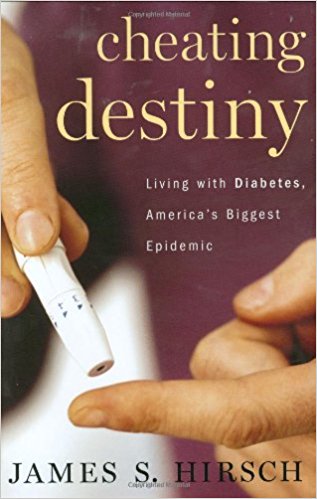 Cheating Destiny: Living with Diabetes, America’s Biggest Epidemic by James S. Hirsch, Houghton Mifflin Company, 2006.
Cheating Destiny: Living with Diabetes, America’s Biggest Epidemic by James S. Hirsch, Houghton Mifflin Company, 2006.
I had been reminded of this book when I got some rather unsettling news about my blood sugar back at the beginning of this year, but I couldn’t remember the title and my Google searches under “diabetes memoir” were unsuccessful. As I’ve been consciously monitoring my blood sugar levels over the past few weeks I’ve been reminded of it again, and for some reason this time I was able to track it down. Hirsch is a journalist and author. He is also a type 1 diabetic and already had been planning to write a book about the disease when his 3-year-old son was diagnosed with the same condition. (Or disease. There’s some controversy as to what label diabetes should have.)
Type 2 diabetes, covered much less extensively in this book, is the condition that I seem to be hovering on the brink of, although both conditions involve loss of beta cell function. I’ve been doing a lot of reading about this condition but never quite understood that a person will not develop type 2 diabetes without at least some loss of beta cell function. If someone is overweight and sedentary, both of which bolster a tendency to type 2 by increasing cells’ insulin resistance, as long as the pancreas is able to keep pumping out more and more insulin, enough to get the sugar into the cells, that person will never develop type 2 diabetes. (He or she will inevitably develop other conditions related to weight and lack of activity, just not diabetes.) And since you can’t know in advance what your beta cells’ limits are, best not to test those limits!
The rather depressing thing about this book is that, while it was written in 2006, the medical information contained in it doesn’t sound at all different from what’s out there today. The recommended blood sugar levels have been lowered, but the tools to get to those levels have not been improved. The cover photograph shows a spring-loaded skin pricker that’s identical to the one I use except for color. Those of us who are fans of Gretchen Rubin‘s work know all about her sister Elizabeth’s type 1 diabetes; what she’s doing to treat it sounds no different from the recommendations in this book. (Interesting fact: Elizabeth’s type 1 may have been triggered by a bad bout of the flu; yet another reason to get your yearly shot, even if some year’s vaccines are better than others. This past year’s version was apparently only 15% effective, and I never got one, but hey—15% is better than nothing!)
The dance between acute infectious disease and chronic conditions proves once again, if we need proof, that we live in a fallen world. Make people live longer by conquering diphtheria, polio, typhus, cholera, measles, etc., etc., and then they topple over into heart disease, diabetes, and cancer. Make people stop dying of starvation and they die of overeating. We will never, ever reach the point at which we’re all healthy, but that’s no reason not to do all we can for ourselves and those around us. I’m writing this as we’re heading back to Denver from our anniversary trip, and we just stopped for gas. It’s getting into the afternoon and I’m a little hungry. There was a panoply of candy in the gas station store. Kind of tempting. (Although I would have had to brave the sarcastic comments from my husband had I showed up back at the car with some horrible purchase.) I could have justified a purchase. But no. I should do all I can to keep things under control. A nice healthy dinner will be coming up soon. Keeping a tight rein makes me happier, both in the long and the short term.